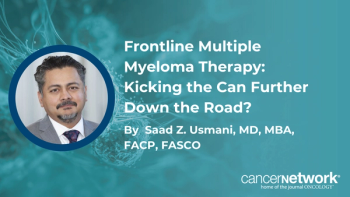
Oncology NEWS International
- Oncology NEWS International Vol 5 No 1
- Volume 5
- Issue 1
NCCN to Develop Outcomes Database Based on Guidelines Use
PHILADELPHIA--The clinical practice guidelines developed by the National Comprehensive Cancer Network (NCCN), to be presented at the coalition's first conference in March, represent the first step toward a larger goal--developing a database of how those guidelines are used throughout the network.
PHILADELPHIA--The clinical practice guidelines developed by theNational Comprehensive Cancer Network (NCCN), to be presentedat the coalition's first conference in March, represent the firststep toward a larger goal--developing a database of how thoseguidelines are used throughout the network.
"We'll collect data on how the guidelines are followed, theextent to which treatment deviates from the guidelines, the costof treatment, and the outcomes of the treatment," Bruce Ross,NCCN executive director, said in an interview with Oncology NewsInternational from the network's headquarters in Philadelphia.The NCCN, founded last year, is a coalition of 13 leading cancercenters in the United States.
"Once we have a database," Mr. Ross said, "we can,for the first time, go to insurance companies and managed careorganizations, and say, 'This is how we treat patients, this iswhat it cost, and this is how the patients fared.'"
Mr. Ross, who had a long career at Bristol-Myers Squibb beforejoining the NCCN as its first full-time professional manager,said that he is looking forward to the upcoming conference.
"It will be the first public display of our guidelines andthe first time we will be able to meet face to face with the peoplewith whom we hope to do business," he said. He expects theNCCN members to use the conference to "begin a dialogue withthe insurers, to ask and answer questions."
Those targeted to attend the conference include not only peopleaffiliated with the coalition's 13 member institutions, but alsointerested non-affiliates and representatives from insurance companies,managed care organizations, and the pharmaceutical industry. "Somemembers of the pharmaceutical industry will speak at the conferenceto present their side of the story," he said.
He noted that the group's practice guidelines will be copyrightedand made available to NCCN members and their affiliates (hospitalsthat are part of each cancer center's local network). A uniquefeature of the guidelines is that they will be updated regularly,perhaps as often as monthly, or any time clinical research providesnew insights.
Mr. Ross stressed that the NCCN does not expect rigid compliancewith the guidelines, "because no guidelines can ever takethe place of the physician/patient interaction, and the physicianmust be free to make his or her own choices based on the needsof the individual patient."
Articles in this issue
about 30 years ago
HCFA Reevaluations May Affect Chemo Administration Cost Codesabout 30 years ago
Breast Cancer Info Now on Internetabout 30 years ago
HDC/ABMT Has Benefits in Multiple Myelomaabout 30 years ago
Reporting of Study Comparing Casodex, Eulexin Is Questionedabout 30 years ago
Limits on Tamoxifen Duration Questionedabout 30 years ago
ACRO Forecasts Radiologist Surplusabout 30 years ago
Potency Status Before RT, Not Dose, Determines Post-RT Functionabout 30 years ago
Dr. Klausner Outlines Goals for NCIabout 30 years ago
Difficulties in Translating Relative Risks Into Absolute RiskNewsletter
Stay up to date on recent advances in the multidisciplinary approach to cancer.






































